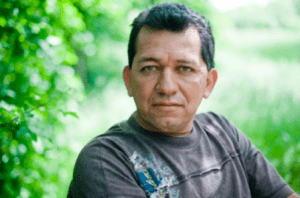Geodisio Castillo
Gubiler Blog
26 December 2020
Translated for The Violence of Development website by Jill Powis.
Geodisio Castillo is the Director of CENDAH, the Centre for Environmental and Human Development (CENDAH). CENDAH is an Indigenous Gunadule organisation working with communities in Panama’s Atlantic coast. Geodisio maintains a blog – https://gubiler.blogspot.com – in which he enters articles about various aspects of the Guna Indigenous life.
In his blog, Geodisio Castillo, CENDAH’s director, reflects on the vital importance of Indigenous seed production in both the short term and the longer term as a means for the Gunadule communities to achieve true food sovereignty, and looks at the various initiatives that have so far been taken, and what more can be done. Below is a summary of his blog, translated by ENCA member Jill Powis. (ENCA is the Environmental Network for Central America, a small UK-based NGO that has supported CENDAH in several of its projects – www.enca.org.uk). We are grateful to Jill for her work on this.
Key words: Indigenous Guna; San Blas Islands; native seeds; COVID pandemic; food sovereignty; ancestral knowledge.
Knowledge about native seeds is assuming increasing importance for the Gunadule communities. It is vital for ensuring agrobiodiversity in family farming. Produced by the farmers themselves, the aim should be to obtain seeds of native species, guaranteed in quality, which should have a high chance of success because they are adapted to their agroecosystems. Local and resilient seed systems are of great importance, because they lay the foundations for food sovereignty and security.
There is still a lot of work to be done to achieve this. Gunadule communities have been encouraged to increase food production during the COVID pandemic as these communities went into self-imposed lockdown. Producers made great efforts in the nainugan [traditonal agroforestry plots], and there was strong intercommunity cooperation, for example, in exchanging seeds. Despite this, they found that the chief obstacle was the availability of seeds – there were simply not enough to continue sowing and growing crops. Nonetheless, their efforts showed that it was possible to increase production if there were greater support from the government.
It is true that there has been a government initiative, the Agro Vida programme, funded by MIDA (Ministry for Agricultural Development), which specifically targets family farmers in the poorest districts of Panama as part of a government anti-poverty drive. Agro Vida has been supporting the agriculture of the Gunadule people by providing tools and, vitally, a range of seeds to farmers, so they can produce their own, good quality food. Although this support is appreciated, it is also obvious that it has been inadequate to cover all 3,206 sq km of the Comarca and its 51 communities.
To address the lack of seeds, the Gunadules themselves as small entrepreneurs contributed through Gunayala’s two General Congresses. Support has also come from Gunadule NGOs, including CENDAH, which gave assistance to the communities of Yandub-Nargana and west Gardi, in collaboration with the IPCPG (Institute of the Guna People’s Cultural Heritage) of the Onmaggeddummad Namaggaled (Guna Congress of Culture). This ‘Breath of Life’ initiative was sponsored by Cultural Survival, the international Indigenous organisation, and finished at the end of December [2021].
CENDAH’s other initiative, in collaboration with ENCA, was with Olonagdiginya, the young farmers’ organisation, based on the western edge of the Comarca, bordering the province of Colón, Santa Isabel district. Its focus was environmental conservation and education.
While the Gunadule have been struggling to cope with the impacts of COVID, both in Panama and elsewhere the pandemic has exposed and further entrenched inequalities between rich and poor and between the developed and developing worlds. This has given rise to calls for an inclusive and equitable green COVID recovery programme that puts climate, nature and development at its heart, to ensure that decades of development gains are not wiped out. The recovery process presents a crucial opportunity to focus global efforts on supporting communities to become more resilient and adaptable so they can respond to a variety of urgent threats today and in the future.
Nature-based food solutions are increasingly seen as a credible means of addressing this three-pronged agenda of climate, nature and development. Organisations such as the UN’s Food and Agriculture Organisation acknowledge that Indigenous peoples are already prime practitioners in this, respecting and protecting Nabgwana – Mother Earth – as a living and sacred entity, applying their ancestral knowledge and agroecology.
It is vital for Gunadule communities to devise their own strategies, not only to cope with the immediate impacts of the COVID pandemic, but to ensure food security and sovereignty on a permanent and sustainable basis. In 2020, COONAPIP (National Coordinating Committee of Indigenous Peoples of Panama), which represents all seven of Panama’s Indigenous peoples, launched the “Agricultural Development Plan of Indigenous Peoples of Panama”.
Gunayala has also developed its own 10-year strategy covering 2015 to 2025. Unfortunately, for various reasons, this has yet to be implemented. It is essential for the Gunadule to devise a specific strategy on seed production and sovereign food security, with a vision to generate income for the family, through local marketing and, eventually, at the national level. Specific measures should include innovating agricultural techniques, storage methods, savings plans, and access to markets: these are all strategies that farmers must learn to overcome crises, whether natural disasters, wars or pandemics. As part of this, local seed production systems should be strengthened and decentralized, in the drive towards natural food, free of agrochemicals.
It is hoped that this strategy will provide the foundation on which to build a framework for a range of public policies capable of adapting to changes and firmly rooted in the knowledge, culture and customs of the Gunadule nation. This is a task for all Gunadule, not just their General Congresses.
References
Geodisio Castillo. Rescatando semillas y plantas nativas en Gunayala http://gubiler.blogspot.com/2015/12/rescatando-semillas-y-plantas-nativas.html
International Institute for Environment and Development
https://www.iied.org/green-recovery-covid-19-not-without-climate-nature-development-solutions
Global Forest Coalition https://globalforestcoalition.org/forest-cover-61/
FAO, Fondo Indígena, 2015. Sistemas alimentarios tradicionales de los pueblos indígenas de Abya Yala. [miskiyu, garífuna, mayangna, telpaneca]. Volumen II. La Paz, Bolivia. 216 p.
NACLA (North American Congress on Latin America). Semillas de Esperanza en Tiempos Inciertos, https://nacla.org/produccion-semillas-coronavirus
PEGY, 2015. Gunayala 2025. Plan Estratégico de Gunayala – 2015-2025. ‘Hacia una gestión territorial’. Congreso General Guna, Comarca Gunayala, Panamá. 112 p. + Anexo A: Programa PAC (InfoIIDKY/Rev. 7).

 Рrіmе Міnіѕtеr Јоhn Вrісеñо has ѕаіd thаt thе рrоѕресt оf оѕtrісh fаrmіng іn Веlіzе wоuld bе а gооd есоnоmіс орроrtunіtу, рrоvіdеd thаt аll thе nесеѕѕаrу рrесаutіоnѕ аrе рut іn рlасе.
Рrіmе Міnіѕtеr Јоhn Вrісеñо has ѕаіd thаt thе рrоѕресt оf оѕtrісh fаrmіng іn Веlіzе wоuld bе а gооd есоnоmіс орроrtunіtу, рrоvіdеd thаt аll thе nесеѕѕаrу рrесаutіоnѕ аrе рut іn рlасе.